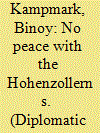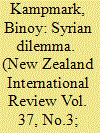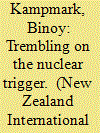| Srl | Item |
| 1 |
ID:
114992


|
|
|
|
|
| Publication |
2011.
|
| Summary/Abstract |
This article examines the origins of American neo-conservatism by assessing the contributions of one of its less known inspirations, James Burnham. In charting Burnham's political philosophies and various contemporary reactions to them, this article examines his legacy as it relates to the movement, specifically in his approach to foreign affairs and institutions. It argues that he was more a pioneer than is often acknowledged. In so doing this article also corrects misunderstandings that have arisen in critiques of neo-conservatism, suggesting that Burnham's oeuvre may offer more instructive guidance than some of his contemporaries in understanding the neo-conservative revolution in American foreign policy.
|
|
|
|
|
|
|
|
|
|
|
|
|
|
|
|
| 2 |
ID:
128912


|
|
|
| 3 |
ID:
099985


|
|
|
|
|
| Publication |
2010.
|
| Summary/Abstract |
The notion that a nation's 'people' are the sovereign arbiters of its affairs, exercising power through a representative leadership who govern in the name of public 'virtue', point to a concept of political legitimacy which has proven to be a guiding principle in American diplomacy. The Wilson administration's response to peace overtures by the German government between 1917 and 1918 is a good illustration of this tendency. In line with American domestic political mores and values, the Wilson administration, along with the U.S. Congress and American publicists sought to encourage a political reshaping of Germany through aggressive public diplomacy. This was achieved by apportioning war responsibility between sections of German society (guilty autocrats and subservient citizens). The legitimacy of the German state as an equal partner in international relations, was thereby questioned. This distinction, in time, collapsed showing the inconsistencies within the Wilson administration in challenging the internal workings of a foreign government.
|
|
|
|
|
|
|
|
|
|
|
|
|
|
|
|
| 4 |
ID:
105488


|
|
|
| 5 |
ID:
128802


|
|
|
| 6 |
ID:
096406


|
|
|